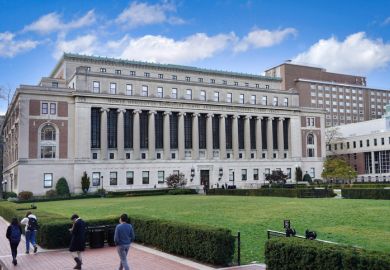There have been vague rumours of a lower fee cap for STEM students alone, but that seems unlikely to win over many voters
Ever since the Browne review on higher education funding reported four years ago, people have been trying to guess what position the Labour Party will take on tuition fees in its 2015 election manifesto.
The party’s initial reaction to the coalition’s tripling of fees was fierce. But that did not last long. While MPs stamped their feet, the man who had set up the Browne review, Peter Mandelson, revealed in his memoirs that he would have doubled tuition fees to £6,000.
Ed Miliband formally adopted a £6,000 fee cap at the 2011 Labour Party Conference – a full year before the coalition’s higher fees took effect. So the difference in policy between Her Majesty’s Government and Her Majesty’s Opposition was one of degree, not principle. Hardly surprising, perhaps, given that it was Tony Blair who had introduced tuition fees in 1998 and then tripled them for the first time in 2006.
Many people believe that the Labour Party continues to be committed to reducing the fee cap to £6,000 should it win at the polls in May. While students look longingly at the chance to accrue lower debts, vice-chancellors worry about having less income.
But the architect of Labour’s 2011 policy, John Denham, was always very careful to say that it was what the party would do were it in office during the 2010 Parliament. It was never a firm commitment to reduce fees after the £9,000 system had dug firm roots.
Since Denham relinquished his role as universities minister, Labour’s higher education policy has been in the hands of two different people. But neither Shabana Mahmood nor her successor Liam Byrne has offered a clear alternative to £9,000 fees. Byrne started 2015 by calling for a review to “look at every possible option for protecting the unit cost of funding but also bringing down the cost to students”. There have since been vague rumours of a lower fee cap for STEM students alone, but that seems unlikely to win over many voters.
Miliband, Byrne and many other Labour MPs have also spoken about the long-term option of a graduate tax. Just before becoming leader of the Labour Party, Miliband promised that he would “in coming months produce a plan for replacing tuition fees with a new graduate tax to fund our universities”. But that has never appeared. Critics point out that no country in the world has adopted a true graduate tax and it seems unlikely that England will become the first to do so.
Labour has clearly left itself open to the charge that it is entering an election period without clear higher education policies. Is this wise?
It is possible that a timid and ambiguous policy is precisely the best position for Labour to take in electoral terms. A recent Higher Education Policy Institute report, Do students swing elections? Registration, turnout and voting behaviour among full-time students, revealed that almost half of full-time students intend to vote for Miliband and his team at the general election. That could swing about 10 seats to Labour in what is expected to be the closest election for decades.
Putting more flesh on the bones of Labour’s higher education policies risks harming the party’s electoral prospects by pushing some potential supporters away. Of course, if Labour were to win the election, the pain would come afterwards when it would need to forge an affordable policy that worked for students and institutions.
The current lack of clarity is not limited to Labour. It is also unclear whether the other two big parties will stick with the current funding structure in its entirety. Will they increase the £9,000 fee cap? Will they convert more living-cost support from grants to loans? We just don’t know. Given that BIS is not immune from the next wave of cuts, these are not rhetorical questions.
That makes it all the more important that the higher education sector goes on pressing the parties for answers. The forthcoming 2015 Election Hustings for Higher Education, organised by Times Higher Education, the Higher Education Policy Institute, The Open University and Universities UK, will provide a great opportunity to do so.
Register to continue
Why register?
- Registration is free and only takes a moment
- Once registered, you can read 3 articles a month
- Sign up for our newsletter
Subscribe
Or subscribe for unlimited access to:
- Unlimited access to news, views, insights & reviews
- Digital editions
- Digital access to THE’s university and college rankings analysis
Already registered or a current subscriber? Login





